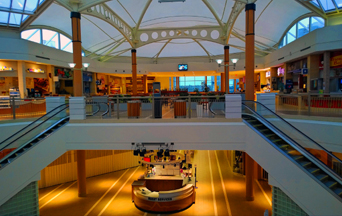
As the Christmas season ends, there is a general agreement that the age of malls is coming to a close. Retail sales are no longer dominated by the vast complexes of physical shops anchored by big-box stores once found all over the country. Indeed, malls are no longer delivering the goods to shoppers looking for the next great thing in their intemperate shopping experience.
Malls have lost their mystique. They are not on the cutting edge of where to buy things. They are now the victims of a process of substitution of which they were once the dominating newcomers. Malls replaced shopping centers and downtown shops as the convenient place to find everything. Now it is their turn to be replaced, as shoppers abandon what they once adored.
Malls are dying for three reasons.
Learn All About the Prophecies of Our Lady of Good Success About Our Times
Malls Are Boring
The first is that malls are boring. They filter out all the human interest elements in the market. Nothing surprising or memorable happens in malls; they are intentionally sterile and unexciting. They cannot fulfill the social functions of the town centers they replaced.
In addition, malls themselves have become similar to one another. A spirit of dreary sameness has descended upon them as they increasingly contain the same stores and basic selections of goods wherever they are found.
Malls Are No Longer Convenient
Each successive change in shopping habits was done in the name of convenience and efficiency. Now malls are cumbersome since they cannot compete with instant alternatives. They take precious time from shoppers who are always in a rush.
Malls are being replaced by online shopping venues like Amazon and giant retailers like Walmart Supercenters. These present an even broader assortment of goods and convenience without the need to travel and enter different stores.
Malls Are Impersonal
Finally, malls are impersonal. They destroyed the connection between merchants and the local population. The big-box stores in malls have owners and corporate headquarters hundreds of miles away and with few to no links to the community. Employees in malls rarely establish lasting personal relationships with customers. The stores themselves have no loyalty to the consumers, as underperforming stores can be closed without notice.![]()
FREE e-Book: A Spanish Mystic in Quito
Thus, as social beings, people are frustrated by the increasingly impersonal nature of malls.
Why the New Shopping Experience Will Also Fail
Thus, people are now looking for new ways to shop, which will be more meaningful and exciting. They are turning to new options ranging from giant online and offline retailers to boutique stores with unique offerings that one cannot click and obtain on Amazon.
However, these new experiences are doomed to fail. Giant online and other retailers like Amazon and Walmart will offer many more choices quickly and efficiently. However, they will be even more impersonal than malls, as shoppers will increasingly interact with their electronic devices. Moreover, the choices may be expanded, but only to a larger number of super-standardized choices representing a bland global culture.
10 Razones Por las Cuales el “Matrimonio” Homosexual es Dañino y tiene que Ser Desaprobado
On the other hand, boutique products reflect the other extreme of offering truly unique items. However, these offerings have little personal links with the customer or the local culture. More often than not, they represent the buying of someone else’s culture. Such purchases usually do not help build a community or culture.
Neither option can satisfy the human desires for goods and relationships that end up forming a culture.
Characteristics of an Authentic Market
Consumer society suffers from a fundamental flaw that limits consumption to a purely economic act. The producer dictates what is on the modern market. Consumers restrict their participation to the consent of their purchases.
In an authentic market, demand should influence production much more than production should determine demand. There should be a close interrelationship among producers, inhabitants, and the locality.
A market that reflects a culture should continuously be adjusting available materials to community tastes. By this interplay of tastes and possibilities, producer and consumer become the “co-creators” of goods. From this comes the basis of an authentic culture. A local cuisine, for example, develops when chefs constantly adjust their dishes and native ingredients to reflect what the community likes.
Three Reasons Why Self-Service Can Harm an Economy and Human Relationships
In a proper market, production should be a distilling process where the people experience the spiritual joy of seeing the product of their joint creativity with the materials at hand. This happiness is compounded when families refine their products over the course of generations. Production then serves as a mirror of the culture and a means toward the perfection of society. In this way, an area becomes “known” for its particular wines, fruits, or handicrafts.
Nothing Beyond the Mall
Such a distillation does not happen in today’s economy. Such markets will not be soon in coming, since the process would involve much more than just economic changes. This kind of economy can exist only inside a social, political, and cultural framework based on a moral order and the stability of the family.
Until such changes take place, the act of shopping will continue as a mere economic act. The new options beyond the mall will stray ever farther from culture-linked authentic markets. The end of malls will not make shopping better, but merely add to the frustration of always looking for the next great thing in intemperate consuming.
As seen on American Thinker.

